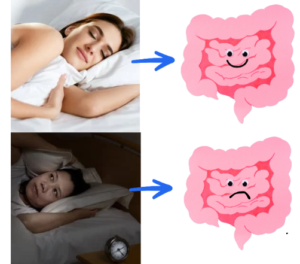Understanding the Critical Relationship Between Quality Sleep and Digestive Health
Sleep serves a purpose far beyond mere rest; it is an essential process that profoundly affects our digestion. Although the connection between sleep and digestive health may not be immediately obvious, it encompasses a range of intricate physiological functions that work together seamlessly. The body's circadian rhythm, often referred to as the internal clock, synchronises both sleep patterns and digestive activities. This alignment elucidates why individuals typically feel hungry at similar times each day, showcasing how our bodies are efficiently attuned to natural biological cycles.
Recognising the Importance of Restorative Sleep for Digestive Function 
Sleep is crucial for the body's ability to heal, rejuvenate, and restore itself. The deeper stages of sleep are particularly significant for these restorative processes. During these vital phases, the organs, tissues, and cells that constitute the digestive system not only relax but also engage in critical repair functions. The body prioritises cellular repair and growth during deep sleep, focusing on regenerating the cells that line the digestive tract, which endure constant wear and tear from food particles and digestive enzymes. This regeneration is essential for maintaining the integrity of the gastrointestinal lining, thereby enhancing the effectiveness of digestion.
Deep sleep also plays a pivotal role in strengthening the immune system, which is especially important for the digestive system, as it contains specialised immune cells activated by beneficial bacteria found in the gut. These immune cells are essential for protecting the gut and the entire digestive system against harmful microorganisms, thereby ensuring a balanced microbiota within the gut environment.
Moreover, the organs within the digestive system are integral to the detoxification process, aiding in the removal of waste and harmful substances from the body. Deep sleep enhances this detoxification process by optimising the functional efficiency of the liver and kidneys, enabling these organs to operate at their peak. This synergistic relationship between sleep and detoxification plays a significant role in promoting overall digestive health and wellness.
Understanding the Link Between Gut Motility and Sleep Cycles
An essential aspect of digestion is the efficient movement of food and waste through the digestive tract, a process known as gut motility. This process undergoes noticeable changes during sleep. Throughout both deep and light sleep, the rate of gut motility is significantly decreased. This reduction is a necessary adaptation, allowing the digestive system to conserve energy, which is then redirected towards repairing digestive tissues. This energy conservation enables the digestive process to function more effectively during waking hours, thereby optimising nutrient absorption and waste elimination.
The migrating motor complex constitutes a cycle of contractions that occurs during fasting periods, including during sleep. This cycle is vital for gut motility, as it effectively clears away food particles and residue that may remain in the digestive system. This natural cleansing mechanism of the digestive tract reduces the risks of bacterial overgrowth, fostering a healthy gut environment. Notably, the migrating motor complex is most actively engaged during the night when individuals are fasting and asleep, underscoring the crucial role of sleep in protecting the health of the digestive system.
As dawn approaches, gut motility gradually increases, preparing the digestive system to efficiently process and digest food. This rise in motility can also trigger the first bowel movement of the day, exemplifying the finely tuned relationship between sleep and gut motility. Recognising this connection is essential for optimising digestive health and enhancing overall well-being.
Investigating the Hormonal Interactions Between Sleep and Digestion
Ghrelin, commonly known as the hunger hormone, plays a crucial role in stimulating appetite. In contrast, leptin informs the brain that the stomach is full, helping to prevent overeating. Together, these hormones are integral to appetite regulation; however, their functions can be negatively impacted by insufficient sleep.
Even a single night of inadequate sleep can lead to elevated levels of ghrelin, which can heighten appetite and often result in cravings for carbohydrates. This condition is frequently described as feeling ‘hangry’. Further compounding this issue, levels of leptin can decrease following a night of poor sleep, disrupting the signals that indicate satiety. This creates a challenging situation where individuals may overindulge and make unhealthy food choices while struggling to interpret their body's signals to cease eating. Although occasional poor sleep may not lead to severe consequences, chronic insomnia can result in significant digestive disorders, including gut inflammation, liver issues, gastroesophageal reflux disease, inflammatory bowel disease, and even colorectal cancer, alongside contributing to weight gain.
Understanding the Impact of Sleep Disruption on Digestive Health
Disruptions to sleep can contribute to a range of digestive issues. Factors such as shift work, particularly night shifts, and experiencing jet lag can significantly disrupt sleep patterns and disturb the body’s internal clock. Additionally, late-night eating or irregular meal timings can adversely affect the quality of sleep. The circadian rhythm, which governs sleep, is closely linked to natural sunlight, which plays a fundamental role in maintaining a healthy sleep-wake cycle.
Regrettably, in today’s technology-oriented world, many individuals spend substantial time indoors, resulting in diminished exposure to natural light. This shift has led to increased exposure to blue light emitted from devices like laptops, televisions, and smartphones, further disrupting the sleep cycle and overall sleep patterns, particularly when this exposure occurs shortly before bedtime.
The cumulative effects of these factors can lead to severe digestive issues, including diarrhoea, ulcers, inflammatory bowel disease, or the disruption of the delicate balance between beneficial and pathogenic bacteria within the gut. This imbalance can also damage the gut lining, complicating the situation concerning digestive health.
Enhancing Microbiome Health Through Quality Sleep
The microbiome consists of trillions of microorganisms inhabiting the gut, primarily made up of beneficial bacteria known as probiotics, alongside viruses, fungi, and potentially harmful bacteria. These microbes are vital not only for overall health but also for digestive health. They bolster the immune response and assist in digestion by facilitating the production of specific vitamins, enzymes, hormones, and amino acids. Recent studies have underscored a significant connection between the microbiome and sleep, indicating that disrupted sleep or chronic insomnia can negatively influence the balance of these microbes, ultimately impacting digestive health and overall well-being.
Navigating the Complex Interactions Between Microbiome Health and Sleep Quality
The connection between sleep and microbiome health is complex and multifaceted. Poor sleep can negatively impact microbiome health, while an imbalanced microbiome can also detrimentally influence sleep quality. To grasp this intricate interplay, one study noted a correlation between a higher abundance of specific bacterial strains in the gut and quicker sleep onset, alongside fewer awakenings throughout the night. Although this article cannot cover all the findings in detail, the key message is that cultivating a diverse and abundant population of beneficial bacteria in the gut is crucial for achieving optimal sleep, effective digestion, and maintaining overall health.
Investigating the Interrelationship Between Stress, Sleep, and Digestive Health
A common consequence of stress and anxiety is the disruption of sleep. Conversely, these mental health issues can also adversely affect the physical health and functionality of the digestive system. This disruption can lead to altered gut motility and contribute to complications such as indigestion, ulcers, and irritable bowel syndrome. A critical element in this dynamic is the influence of the so-called stress hormone, cortisol.
Examining How Cortisol Affects Digestive Processes
When cortisol levels rise, the body's response involves entering a fight-or-flight state. This physiological reaction results in blood flow being redirected to critical areas such as the heart, brain, lungs, and muscles, while blood flow to the digestive system is reduced. This response prepares individuals to either confront danger or flee, a reaction that was vital for survival in ancient times.
In modern times, however, stressors are often not life-threatening, such as financial worries, work-related pressures, or insufficient sleep. While the short-term diversion of blood flow may be beneficial in acute situations, chronic stress can have detrimental effects on the digestive system, particularly in relation to gut motility. This can manifest in symptoms such as constipation, diarrhoea, indigestion, gas, and bloating. Consequently, implementing effective stress management strategies is essential for supporting both gut health and achieving quality sleep.
Ensuring sufficient sleep is vital for maintaining a healthy digestive system, as the relationship between sleep and digestion is inherently interconnected. Prioritising effective sleep hygiene practices is essential for attaining restorative sleep. This encompasses minimising exposure to blue light from electronic devices, adhering to a consistent sleep schedule, creating a cool, dark sleeping environment, avoiding food consumption within two hours prior to bedtime, and ensuring ample exposure to natural light during the day, especially in the morning.
References
Understanding Digestive Health and Circadian Rhythms
Exploring Sleep Dysfunction and Digestive Conditions
Examining the Link Between the Gut Microbiome and Sleep
Investigating Stress and Its Effects on the Digestive System
The Article: How Sleep Affects Your Digestive System appeared first on https://janestevensnutrition.com
The Article: Sleep’s Impact on Your Digestive System Explained appeared first on https://janestevens.net
The Article Sleep’s Impact on Digestive Health Explained Was Found On https://limitsofstrategy.com


Ah, the old “sleep vs. digestive health” conundrum! I’ve often joked that my stomach has a mind of its own—especially when it propels me into those late-night fridge raids. Who knew my circadian rhythm was just trying to keep my gut on schedule?
It’s funny how our bodies can be so unpredictable, right? Those late-night fridge raids might feel like a betrayal, but they’re just our gut trying to communicate. I’ve read some interesting stuff about how our digestion taps into our circadian rhythm. It’s like everything is on this cosmic schedule, but we sometimes miss the memo.
“Absolutely! It’s fascinating how our bodies work in harmony. If you’re curious about optimizing your sleep and digestive health, check out this helpful guide—it might just help tame those late-night cravings!”
https://berwickambassadors.co.uk/trustindex
Your stomach sounds like quite the character, leading those late-night fridge raids like a mischievous sidekick! It’s fascinating how our bodies have their own quirky schedules, isn’t it? I mean, here we are, trying to harness the brilliant science of circadian rhythms, and our guts are like, “Hold my yogurt—time for a midnight snack!”
“Your gut might have its quirks, but understanding its rhythm can really help! Check out these tips to keep both your sleep and digestion on track.”
https://berwickambassadors.co.uk/ParentAler
I love that you’re seeing the humor in all this! Our guts really do seem to have their own personalities, don’t they? It’s like they get to dictate the late-night plans while we try to stick to our routines. Balancing that internal clock can feel like a game sometimes.
“Absolutely! It’s all about finding that balance. For some great insights on syncing your gut and sleep, take a peek at these helpful tips!”
https://berwickambassadors.co.uk/consult
It’s funny how our bodies can feel like they have a mind of their own, right? Those late-night fridge raids can be a real struggle, especially when you’re trying to stick to a routine. I often wonder about the balance between getting good sleep and keeping my digestive health in check. I’ve heard some people say that the timing of meals can seriously throw off not just digestion but also sleep cycles.
You’ve hit on something interesting there. Those late-night fridge raids can feel almost primal, like our bodies are calling the shots. It’s true that the timing of meals can mess with our sleep and digestion. Eating too late can lead to discomfort, which keeps us tossing and turning instead of getting the restful shut-eye we need.
“I totally get that! It can be tough to find that balance. If you’re curious about how meal timing can impact both digestion and sleep, check out this resource for some helpful tips!”
https://berwickambassadors.co.uk/FaceTune